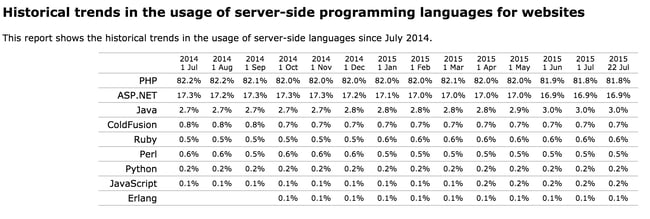 The enterprise technology space is constantly evolving and reading industry news and blogs is one of the best ways to stay on top of the space. Although you may be a subject matter expert in one technology area, such as strategy or security, it’s challenging to be knowledgeable in all areas.
The enterprise technology space is constantly evolving and reading industry news and blogs is one of the best ways to stay on top of the space. Although you may be a subject matter expert in one technology area, such as strategy or security, it’s challenging to be knowledgeable in all areas.
Here are 9 insightful and knowledgeable enterprise technology blogs that can help keep you up-to-date. Browsing these blogs on your daily commute or once a week is a simple way to stay informed on your industry.
1. CIO Online
CIO Online is the premier news site serving IT leaders, as well as the ecosystem that surrounds and interacts with them. This blog is updated on a daily basis and covers topics including big data, cloud, project management, mobile and security.
2. Forrester Research
Forrester is known for their in-depth research reports, playbooks and insightful industry analysts. Most of these reports are paid, but they have a regularly updated blog with articles from various analysts from their team, including a blog geared towards CIOs and IT leaders.
3. TechRepublic CXO
TechRepublic blog is geared towards IT management and executives to help with bolstering their career paths and the perception of IT in the enterprise. Topics covered on this blog include software, cloud, data centres and hardware.
4. CIO Journal - Wall Street Journal
This online section of the Wall Street Journal has reporting and analysis for corporate-technology executives. Updated on a daily basis, the CIO Journal has commentary on strategy, talent management, security and more.
5. Search CIO – TechTarget
Search CIO is one of many blogs in the TechTarget network of technology sites focused on enterprise technology areas such as virtualization, disaster recovery and risk management.
6. CXO – ZDNet
ZDNet CXO is a general technology blog for CIOs, CEOs, CFOs or CMOs. CXO ZDNet is has good general articles on enterprise technology topics, but it’s less in-depth and specific compared to other blogs that are completely geared towards enterprise technology such as TechTarget above.
7. Security Intelligence – IBM
Security is one of the hottest enterprise technology topics today, partially because of the increasing number of breaches and emerging issues like BYOD. IBM’s official security blog is updated on a regular basis with articles from industry experts on nine major security topics such as infrastructure protection, data protection and mobile security.
8. IT World Canada
IT World Canada is an online magazine that’s geared towards Canadian IT professionals about a range of enterprise technology areas and issues including privacy, green IT, cloud computing and analytics.
9. TechCrunch Enterprise
Unlike the blogs listed above which deliver analysis on enterprise technology topics, TechCrunch Enterprise delivers news on up-and-coming enterprise technology startups and new enterprise products/services. Keeping an eye on startups and disruptive products is a great way to stay on top of leading edge trends.
What other blogs would you add to this list?
Don’t forget to sign up for our free monthly newsletter to get the latest news and updates on enterprise technology.

 I started a new software consulting company, KOgent Systems LLC., exactly five years ago today.
I started a new software consulting company, KOgent Systems LLC., exactly five years ago today. Able-One is lucky to have offices in two great technology communities in Ontario. Our head office is based in
Able-One is lucky to have offices in two great technology communities in Ontario. Our head office is based in 